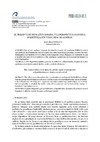Identificador persistente para citar o vincular este elemento:
https://accedacris.ulpgc.es/jspui/handle/10553/70446
| Campo DC | Valor | idioma |
|---|---|---|
| dc.contributor.author | Kratochvílová, Dana | en_US |
| dc.date.accessioned | 2020-02-21T10:53:30Z | - |
| dc.date.available | 2020-02-21T10:53:30Z | - |
| dc.date.issued | 2018 | en_US |
| dc.identifier.issn | 2386-8635 | en_US |
| dc.identifier.uri | https://accedacris.ulpgc.es/handle/10553/70446 | - |
| dc.description.abstract | Este artículo analiza el presente de indicativo español (el paradigma HABLO) desde la perspectiva de los dominios de control y el grado de subjetivización que presentan sus distintos usos. Trabajando con el modelo evolutivo dinámico de Langacker (1991), llegamos a la conclusión de que es posible establecer el valor central de dicho paradigma basándonos en el concepto de dominio de control perceptivo. | en_US |
| dc.description.abstract | The following article analyzes the present indicative in Spanish (the HABLO paradigm) from the perspective of dominions of control and the degree of subjectification that can be attributed to its different uses. Working with Langacker’s dynamic evolutionary model (1991), we conclude that it is possible to establish the central value of this paradigm on the basis of the concept of dominion of perceptive control. | en_US |
| dc.language | spa | en_US |
| dc.relation.ispartof | Philologica canariensia | en_US |
| dc.source | Philologica canariensia [ISSN 2386-8635], n. 24, p. 89-112 | en_US |
| dc.subject | 550510 Filología | en_US |
| dc.subject | 570107 Lengua y literatura | en_US |
| dc.subject.other | Modelo evolutivo dinámico | en_US |
| dc.subject.other | Dominio de control efectivo | en_US |
| dc.subject.other | Lingüística cognitiva | en_US |
| dc.subject.other | Presente de indicativo | en_US |
| dc.subject.other | Subjetivización | en_US |
| dc.subject.other | Dominio de control epistémico | en_US |
| dc.subject.other | Dynamic evolutionary model | en_US |
| dc.subject.other | Dominion of effective control | en_US |
| dc.subject.other | Cognitive linguistics | en_US |
| dc.subject.other | Present indicative | en_US |
| dc.subject.other | Subjectification | en_US |
| dc.title | El presente de indicativo español y la perspectiva cognitiva: subjetivización y dominios de control | en_US |
| dc.type | Article | en_US |
| dc.type | info:eu-repo/semantics/article | en_US |
| dc.identifier.doi | 10.20420/PhilCan.2018.199 | en_US |
| dc.investigacion | Artes y Humanidades | en_US |
| dc.type2 | Artículo | en_US |
| dc.identifier.ulpgc | Sí | es |
| dc.description.esci | ESCI | |
| dc.description.fecytq | Q4 | |
| dc.description.fecytpuntuacion | 21,19 | |
| dc.description.dialnetimpact | 0,0 | |
| dc.description.dialnetq | Q3 | |
| dc.description.dialnetd | D6 | |
| dc.description.erihplus | ERIH PLUS | |
| item.fulltext | Con texto completo | - |
| item.grantfulltext | open | - |
| Colección: | Artículos | |
Citas de WEB OF SCIENCETM
Citations
4
actualizado el 01-feb-2026
Visitas
60
actualizado el 11-ene-2026
Descargas
74
actualizado el 11-ene-2026
Google ScholarTM
Verifica
Altmetric
Comparte
Exporta metadatos
Los elementos en ULPGC accedaCRIS están protegidos por derechos de autor con todos los derechos reservados, a menos que se indique lo contrario.
